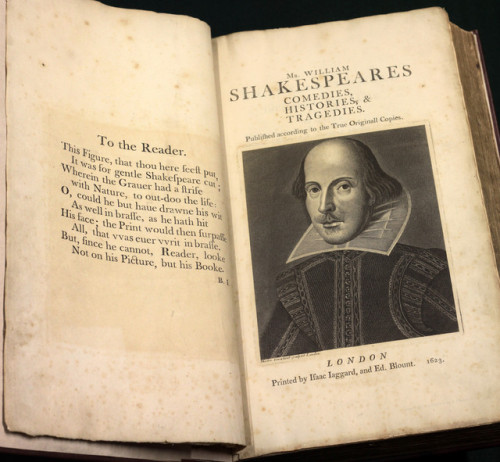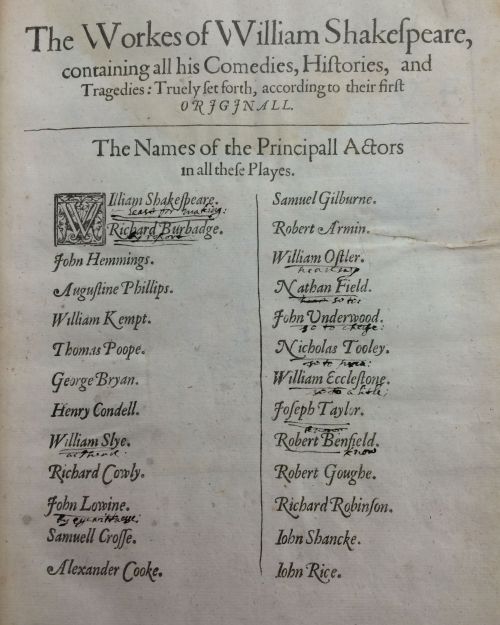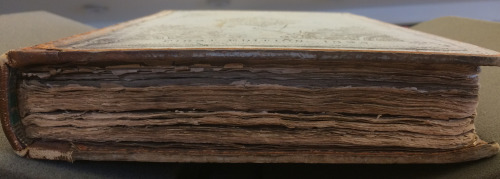Shakespeare - Blog Posts
I may work at a desk so deeply buried in paraphernalia that I only have one small square of surface where I put either my keyboard OR sketchbook, but I insist that my phone apps have a uniform colour that matches the wallpaper.

Hold up.

Tumblr, care to explain yourself?
I read once that shortly before The Merchant Of Venice was written, Queen Elizabeths doctor (who was Jewish) tried to poison her; is that true?
Sort of.
There was a doctor accused of trying to poison Queen Elizabeth. His name was Roderigo Lopez. He was Jewish and of Spanish descent and was fairly well off. He was accused of trying to poison her and conspiring against her with Spanish officials. I believe he is the only English physician to have been executed.
HOWEVER, we don’t know if he actually wanted to poison her. There was no attempt I believe, just accusations. He stated before he died that he “loved the Queen as much as he loved Jesus Christ” which can (and was) be interpreted in many ways. Some people think the Queen thought he was innocent because she took a long time to sign his death warrant. The character may have been the inspiration for Shylock in the Merchant of Venice, since they are both considered villains and evil because they’re Jewish but no one is 100% sure. Based on what I’ve heard, I don’t think he actually wanted to poison the queen and was probably just a target of antisemitism and maybe anti Spanish sentiment but who knows.
Thanks for bringing this up! I’m sure people would love to read about it. I’ve put the Wikipedia article below:
https://en.wikipedia.org/wiki/Roderigo_Lopez#Royal_physician
-Admin @thesunofyork

Comedies Histories Tragedies
Mr William Shakespeare
London Iaggard and Blount 1623
Textual reprint of the First Folio published by J Wright 1807
I am 100% convinced that “exit, pursued by a bear” is a reference to some popular 1590s meme that we’ll never be able to understand because that one play is the only surviving example of it.

Image: The libertine Falstaff sits with a woman on his lap and a tankard in his hand in an illustrated scene from one of William Shakespeare’s Henry IV plays. (Kean Collection/Getty Images)
The eggplant and peach emoji are standard code for racy thoughts these days, but people have been using food as sexual innuendo for centuries. In fact, William Shakespeare was a pro at the gastronomic double entendre [insert blushing face emoji here]. The Salt blog asked a Shakespeare expert to help them decode some of the bard’s bawdy food jokes. (And the result is delightful. – Nicole)
50 Shades Of Shakespeare: How The Bard Used Food As Racy Code









Happy almost birthday, Shakespeare! Or should I say Bard-thday? Recently, in honour of the 400th anniversary of William Shakespeare’s death (conveniently for celebratory purposes, he was born on April 23 1564 and died on the same day in 1616), I was given the incredible opportunity to have a private audience to go through the University of Glasgow’s copy of the First Folio, page by page. I’ve written a short article for the University Library’s blog, which you can find here, but I wanted to share some other images on my own blog that I didn’t have room for on the official post!
The University of Glasgow’s First Folio (more properly known as Mr. William Shakespeare’s Comedies, Histories, & Tragedies) is able to tell so many more stories than those of the plays contained in its pages- of the history of the antiquarian book trade, of the printing practices of the Renaissance, of book ownership and value. Rest assured, you’ll probably be seeing posts from me in the future about all of these things, as well as the typographical ornaments used in the book, which I found fascinating. The University’s Folio is particularly interesting due to the notations by past owners, including one who had apparently seen at least one of the original Chamberlain’s Men “By eyewittnesse”. But my favourite bit of the later additions is the morbid little poem on the reverse of one of the flyleaves: “Pitty it is the fam’d Shakespeare/ Shall ever want his chin or haire.”

Which Shakespeare Play Should I See?
This coming Saturday is the 400th anniversary of Shakespeare’s death! Not sure what Shakespeare play you should see or read to commemorate the occasion? No worries! I’ve put together a little flowchart to help you make up your mind.
HAPPY SHAKESPEARE-ING, EVERYONE!

Titania (A Midsummer Night's Dream) Inspired Barbie
Toy Sunday for the theme: Shakespeare
“Titania is a character in William Shakespeare's play A Midsummer Night's Dream. In the play, she is the Queen of the fairies and wife of the Fairy King, Oberon.”
“Over hill, over dale,
Thorough bush, thorough brier,
Over park, over pale,
Thorough flood, thorough fire;
I do wander everywhere,
Swifter than the moon’s sphere.”
—Spoken by Fairy in A Midsummer Night’s Dream
(Wrinkle in Time Mrs. Whatsit Barbie, 2018)
„Aus Opposition gegen mich selbst“ V
Es käme ein allegorisches Bühnenstück in Frage, Arbeitstitel „ Die Thomas-Bernhard-Schule“, inhaltlich eine Allegorie auf die anthroposophische Pädagogik der Rudolf-Steiner-Schule, um Bernhards Abwertung der pädagogischen Anstalten klärend auf die privat-freiheitliche Pädagogik dieser Privatschulen krachen zu lassen, mit dem Ziel, dieses kontrovers-konstruktiv an einer der sogenannten Waldorfschulen( oder auch an sozialdemokratischen Gesamtschulen) von Schülern selbstorganisiert(!) aufführen zu lassen. Begrifflichkeiten aus der Rhetorik Bernhards werden als Versatzstücke dekonstruierend in die Prämissen R.Steiners eingefügt, um diese miteinander reagieren zu lassen und eine Melange als revolutionäre Ressource zu generieren.
Es könnte sich thematisch eine autonome Gruppe von Schülern entwickeln, die verhindern(wollen), dass etwas von Bernhard aufgeführt wird, dachte ich. Ein Stück für die sogenannte Waldorfschule zu schreiben, (Die Macht der Verwöhnung oder die Rudolf-Steiner-Armee-Fraktion, dachte ich). Ein Stück, in dem lächerlicher Weise Waldorfsalat gegessen werden würde. Die Walnüsse dazu würden von SchülerInnen auf dem Schulhof gesammelt, die unsäglichen Mandarinen dazu würden von zu Hause mitgebracht. Ein Kind, das Dosenmandarinen mitgebracht hat, würde nach Hause geschickt und die Eltern würden zum Gespräch gebeten. Zur Demonstration des steineristischen Freiheitsbegriffes würden Waldorf-Astoria-Zigaretten geraucht und dabei würde von Lehrern laut gebrüllt werden. Musik in etwa : Der Wunderbare Mandarin von Bartok oder Zappas Civilization Phase III . Die Ode an die Feinde würde mit selbsgebastelten Streichinstrumenten eingeübt. Ein Backhaus würde gebaut werden; eine Hexe (E.Jelinek?I.Bachmann?) würde darinnen verbrannt und damit, Märchen als Gleichnis, Wege zur Autonomie aufgezeigt.
Dann : Shakespeare wird verunglimpft! Dann : Die Liebe wird verunglimpft! (Broken Hearts Are For Assholes, True Glove, Zappa)
Einzig das symbiotisch-romantische Zusammenleben des Thomas Bernhard mit „seiner Muse“ und einzigen Frau Hedwig St. wird als siegreiche Überlebensstrategie und Schöpfungsakt glorifiziert ( siehe auch: Er&Sie Monogamie e.V. Anna u. Bernhard J.Blume), in Büchern, jede symbolische Kopulation ein Buch, jede Anfeindung ein Überlebensakt mit Distinktionsgewinn, um nicht vom Leviathan aufgefressen zu werden.
Me and @anobodyinabog watching Disney’s Gargoyles like


I was NOT expecting to have Shakespearean politics within my 1990s Disney cartoon show…

Anne Hathaway´s cottage
Stratford Upon Avon


Double, double toil and trouble
Fire burn and cauldron bubble
- - -
Yes, these are both the same pic but I think they’re neat and I can’t choose between them so you get both. I had to do an assignment for school involving toys and I decided to recreate that scene from Macbeth with my nesting doll.

"And since you know you cannot see yourself so well as by reflection, I, your glass, will modestly discover to yourself that of yourself which you yet know not of" W. SHAKESPEARE in Julius Caesar
W. Shakespeare in Julius Caesar:
"E poiché tu sai di non poterti vedere bene se non per riflesso, io, il tuo specchio, rivelerò con discrezione a te stesso quello che di te stesso tu ancora non conosci"
What, drawn, and talk of peace? I hate the word, As I hate hell, all Montagues, and thee.
Romeo and Juliet by William Shakespeare
I am in blood Stepp'd in so far that, should I wade no more, Returning were as tedious as go o'er.
Macbeth by William Shakespeare




“Ophelia, heaven help a fool who falls in love”
Padme Amidala’s Funeral in Revenge of the Sith (2005)//Ophelia (2018)//Ophelia by John Everett Millais (1852)//“Ophelia” by The Lumineers (2016)

Ellen Terry as Lady Macbeth (1889) by John Singer Sargent

5.20.22
me when i’m drawing ophelia and writing an essay about ophelia and listening to the ophelia score and wearing my hair like ophelia
they should do a remake of the lion king where it’s set in 14th century denmark and all the characters are humans call it “hamlet” or something like that idk i think it could be good




Daisy Ridley as Ophelia in Ophelia (2018)

“Ophelia (And He Will Not Come Back Again)” By Arthur Hughes (1865)

“Ophelia” by John William Waterhouse (1894)

“Juliet” By Thomas Francis Dickinson (1877)

Ophelia by John William Waterhouse (1889)
Fun!

Shakespeare’s Julius Caesar visualized scene by scene.
Source: ghenshaw (reddit)
Read More



